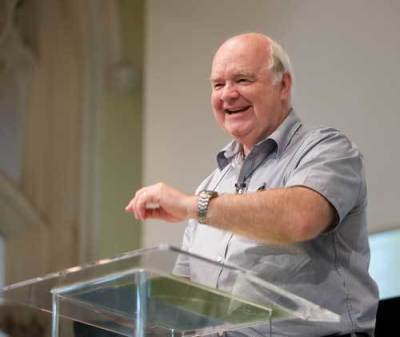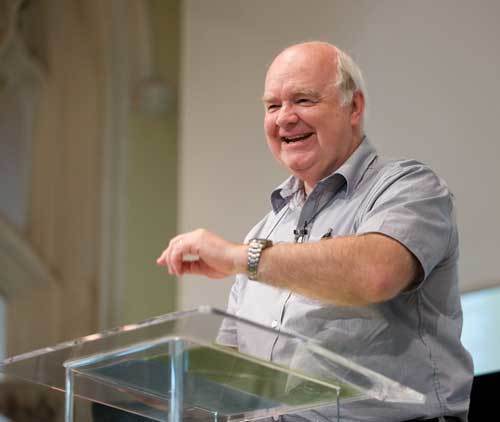
In a wide-ranging and deeply personal conversation, renowned lay theologian and apologist John Lennox has provided a striking reflection on ageing, spiritual resilience and what it truly means to “finish well.”
Lennox, who recently turned 82, spoke about the pitfalls and possibilities of growing old while remaining faithful to the Gospel in an interview recorded for the recent Sing! Conference led by Keith and Kristyn Getty.
Lennox said the idea of “finishing well” wasn't a formula but a lifelong posture, and he drew on Jesus’ words to Peter in John 21 and the prayers of King David to frame the sober reality that even a respected Christian leader can falter late in life.
“The chief test of all shepherds is the way they end up," he said. “It is perfectly possible for a person who has led an exemplary Christian life, been a leader, to end up a silly old fool."
He emphasized that finishing well requires humility, accountability, and an openness to honest correction.
One danger, he said, is that age can harden a person into thinking they no longer need advice: “We must surround ourselves by friends, family who are close enough to us to be honest with us. As you get older, it's very easy to get into the mindset that you know everything and to close down and not listen to anybody. I've watched it again and again happen in people that you would have said it would never happen to them. It can happen to any of us. And it's something to fear in a way.”
Lennox also stressed the spiritual discipline of remaining rooted in Scripture, prayer and meaningful Christian fellowship — all habits that protect the heart from becoming defensive, cynical or spiritually stagnant.
“Some people want to found a church, run a church, and bury a church because they can't let anything go. ... And most of us, unfortunately, have a predisposition to come to a point where we don't listen to anybody anymore. We don't take advice," he said.
A central theme in Lennox’s reflections was the lifelong call to witness. He believes that many Christians lose spiritual vitality when they stop sharing their faith.
“One of the things I believe that has sustained me through life is constantly to be alive to opportunities to witness,” he shared.
“Constantly to believe that there are people out there that you can talk to about the Gospel … there's nothing more life-giving than seeing other people experience what you yourself have seen. In other words, the joy of salvation and beginning to grow.”
Lennox also contrasted the shrinking horizons he sees in many non-religious elderly people with the expanding hope he observes in older believers. Research, he said, supports this difference in outlook.
He explained: “Generally speaking, older Christians, as they got nearer to death, their hearts and minds were getting excited about the fact they were going to be with the Lord, and it was expanding into eternity. Whereas non-Christian people, it was the next year, the next month, the next day or the next hour. Their whole horizon was coming in. And this is a very powerful thing, it seems to me.”
Music, he added, often becomes a powerful anchor of hope near life’s end. He has seen dementia patients unable to form clear sentences suddenly able to sing hymns learned in childhood.
“Because as our bodies begin to fall apart, as mine has, the fact that there is a new world coming in which suffering shall cease and we'll be in glory — that's not a trivial and a vague thing, that is a colossal hope based on the resurrection of Jesus from the dead,” he emphasised.
“So, the hope for the future depends on the events of the past. Which is why we need to constantly transmit this story.”
Asked to recall a memorable example of finishing well, Lennox spoke movingly of his close friend, evangelist Nigel Lee, who died at 58 after a widely influential ministry.
Lennox recalled that his friend had brought thousands to Christ, and that when he tearfully shared he had little time remaining, he asked Lennox to speak at his funeral.
Lee left Lennox with a final charge: “Look, go and tell them to do what we did when we were students — to get into the Word prayerfully and spend real time on it and wait on God until His face appears.
“They will then have something to say,” Lee had told him
He added: “In order to witness, we must have something to say. And there are many people, sadly, in the pulpit today who have nothing to say. And you can tell it within the first few seconds when they start to speak. And the reason is they have not done what the hymn book of the Bible tells us again and again, which is to wait on the Lord.”
He warned that the frantic pace of modern life makes it harder for believers to slow down, reflect and truly seek God.
Relying on quick technological shortcuts — including AI-generated sermons — risks hollowing out spiritual depth, he said, turning helpful tools into substitutes for genuine time in Scripture and prayer.
Lennox further emphasized that Christian hope is anchored not in sentiment but in the historical reality of Christ’s resurrection and His promised return.
“We would expect to see a large proportion of Christians, when they come to the end or towards the end, that they are so rejoicing in what's ahead; that they confirm with their families, children, grandchildren who are watching that ‘dad or granddad believes it's real even at this stage.’”
He described biblical hope as the expectation of God’s coming, noting that both suffering believers and the natural world itself long for God to put things right.
Much of Scripture’s imagery of the world to come, he observed, is expressed in negatives — “no crying … no pain … no suffering … no lies … no deceit … no sin” — because the positive realities are beyond human imagination.
Yet the relational hope remains unmistakable.
Reflecting on Jesus’ Words to Martha at Lazarus’s tomb, he pointed to the significance of Jesus saying, “your brother will rise again,” suggesting continuity and recognition in the life to come.
Lennox noted that this promise offers deep consolation to anyone mourning a spouse or loved one.
He warned, however, against dismissing biblical teaching on creation or the future as outdated or speculative.
“You need a past to have an identity,” he remarked. “You need a future for hope.”
His own recent writing on the book of Revelation aims to restore that sense of anticipation.
As the conversation concluded, Lennox was asked what he personally anticipates as he approaches his ninth decade.
His answer was immediate and filled with the conviction that marked the entire discussion: “I'm looking forward to seeing the Lord and it's going to happen.”
This article was originally published at Christian Today
News Source : https://www.christianpost.com/news/theologian-john-lennox-reflects-on-aging-and-legacy.html
 Your post is being uploaded. Please don't close or refresh the page.
Your post is being uploaded. Please don't close or refresh the page.





